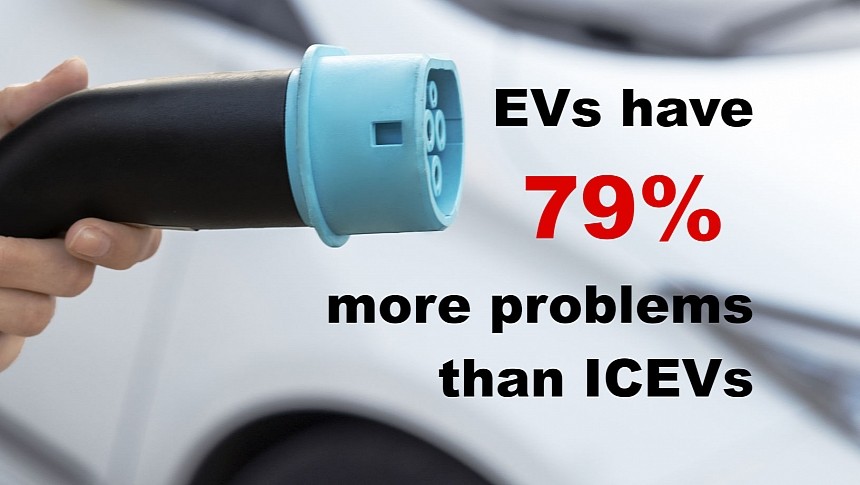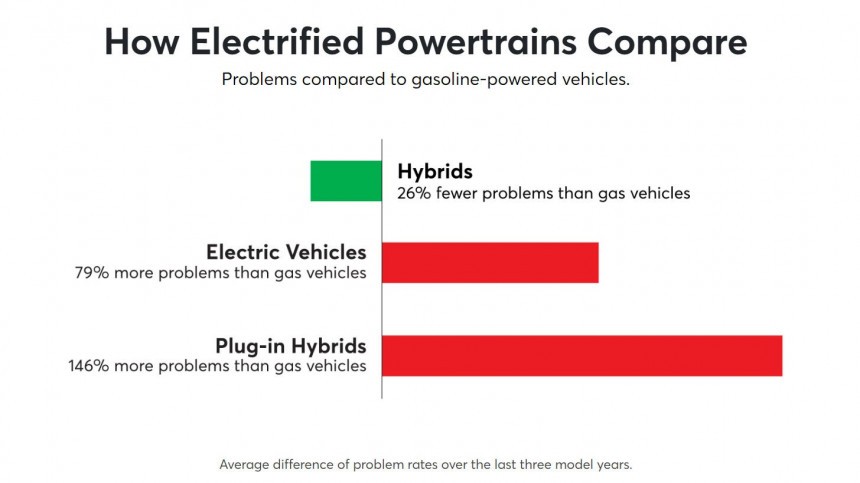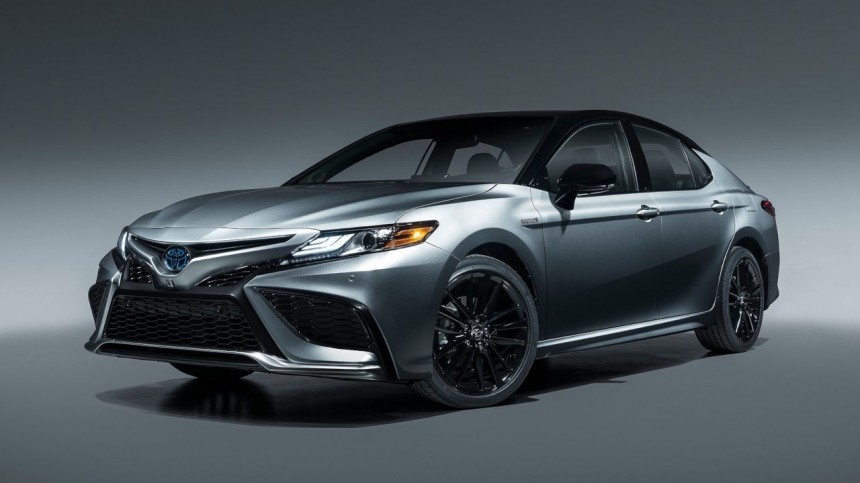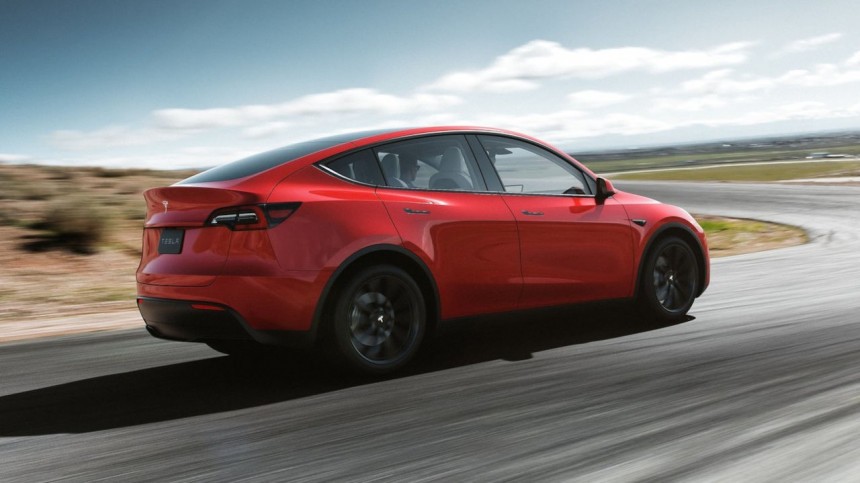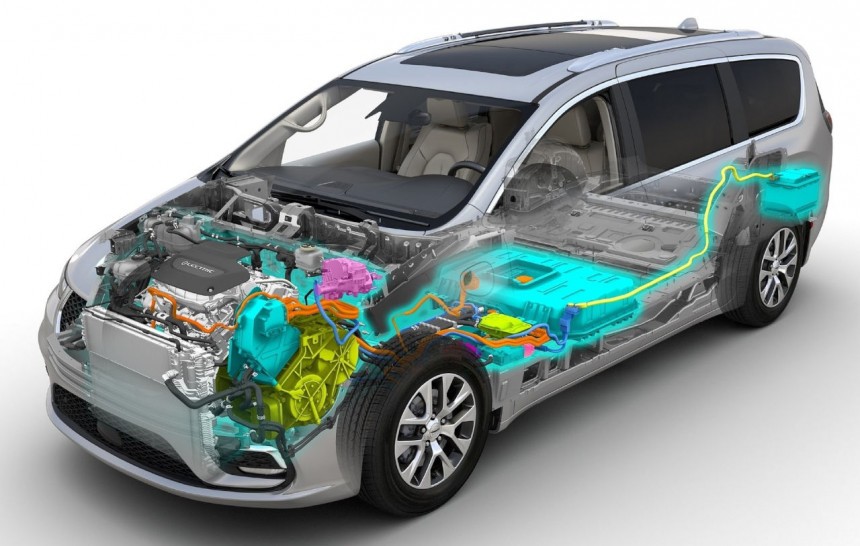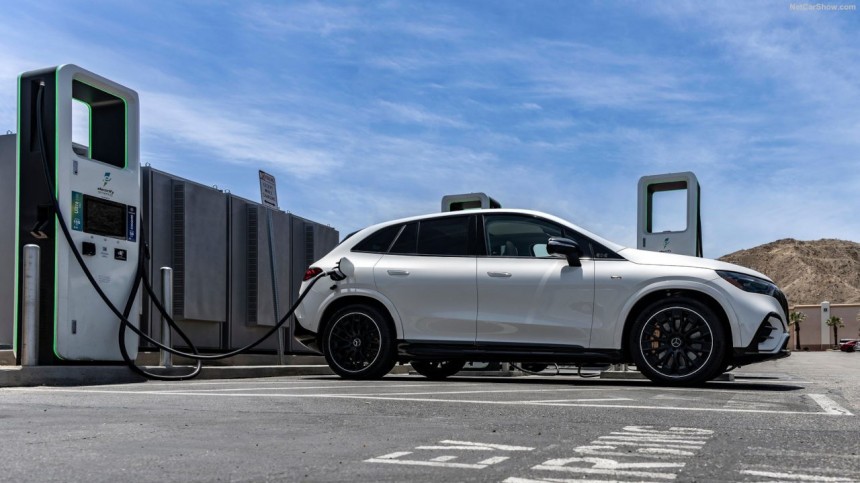This year's Annual Auto Reliability Survey covered 20 problem areas that consumers gave feedback on based on their experience with their vehicles in the last 12 months. Electric and plug-in hybrid car owners seem to have very high expectations (and much disappointment) compared to those who have chosen a conventional gasoline-powered or hybrid vehicle.
Consumer Reports findings will most likely seem very brutal to plug-in vehicle buyers. However, we should not ignore that all the data is based on subjective assessments from regular people who just want safe, reliable cars for any use scenario. It's not sound scientific research, but "people voice" translated into numbers.
Not too much to ease the pain, I know. But don't mistake CR's reliability definition based on subjective feedback for the mechanical one, stating that an electric motor is more reliable than an internal combustion engine because the latter has hundreds of moving parts that need lubrication and are subjected to a higher risk of failing.
That being said, let's see how bad or good the 100% electric vehicles, plug-in hybrids, and hybrids are compared to gasoline-powered cars. Plug-in hybrids (wrongfully, a.k.a. "PHEVs") have 146% more problems than gas vehicles. This must hurt those advocating for the perfect mix of zero-emissions in city traffic and excellent total range for long journeys.
The percentage for fully electric vehicles is "only" 79%, which is truly disappointing and partly explains the recent cool down in EV demand. You can't expect enthusiasm from new clients if the current ones are not entirely content. Apparently, Tesla's fanboys are not the majority anymore to improve the overall score.
Surprisingly, hybrids have 26% fewer problems than conventional cars, which indeed is a strong argument for Toyota. Of course, having a tiny battery (compared to an EV, which means lower prices), relying mainly on the ICE (no "range anxiety" issues), and benefiting from a better city fuel economy than current ICE technology is capable of mean a lot for owners' piece of mind.
We should also remember that CR's methodology changed this year, so comparing 2023's brand reliability data to previous years is futile. This year, the owner satisfaction survey added three new trouble areas aimed explicitly at electrified vehicles: the electric motor, the battery, and charging.
- 100% Electric vehicles have the fewest trouble areas – 12 (as ICE's "Engine" and "Transmission" don't apply);
- Internal Combustion Engine vehicles have 17 potential trouble areas;
- Hybrid vehicles have a total of 19 "sweet spots" because they add "Electric motor" and "EV Battery" to those of ICEVs;
- Plug-in Hybrid vehicles have a total of 20, as they add the "EV Charging" compared to hybrids.
One would expect better results from fewer trouble areas, but this rule didn't apply to CR's survey. The excellent impression of hybrid vehicle' owners is mainly explained by the maturity of this technology (already 26 years since the first Prius hybrid) but also by the fact that Toyota and Lexus – well known for their reliability history – are top-of-mind for hybrid cars.
Of course, not every hybrid out there has an average or above-average score, but as most of them are Toyotas and Lexus, it's easy to understand why this type of propulsion gets such praise. After all, almost all the hybrid models in the survey are made by Japanese carmakers, which have strong reliability records.
On the contrary, electric propulsion and plug-in hybrid technology are still in their infancy. While Tesla has a serious edge in battery, charging, and software, the rest of the carmakers are still learning to make more compelling electric systems.
The first Tesla Roadster came to market 15 years ago, but it was more of a DIY project – it was just a reworked Lotus filled with laptop batteries. In 2010, the Mitsubishi i-MiEV and Nissan Leaf were the first mass-production highway-capable electric cars, while in 2012, the Tesla Model S became the spear of the rEVolution.
So, basically, electric cars have been with us for just a decade. While their technology evolution, particularly battery performances, is really thundering, they still have a long way to go to fulfill the regular customer's needs: ease of charging, no-thrills autonomy, and short times for charging.
In other words, they must beat ICEs and hybrids to their game. And all of this by being more affordable. Because battery technology is still very expensive, carmakers must compromise.
Most of Tesla's customers still complain a lot about building quality (like body hardware, paint, or climate system), while legacy manufacturers fare much better in this regard but fall well behind Tesla in other areas, like powertrain, charging, and battery.
CR resumes this metaphorically: "Legacy automakers need more time to work out the kinks under the hood of their EVs, while Tesla faces above-the-hood issues." As the wave of early adopters is over, the new customers are unwilling to accept compromises easily.
But, overall, the good news is CR sees signs of tangible improvements for electric vehicles. For instance, the Ford Mustang Mach-E is eligible for Consumer Reports' recommendation as it's rated average thanks to EV battery and charging improvements. Which is excellent news for the American industry.
Unfortunately, electric pickups are considered worse for reliability. Ok, there aren't many for now, but they're all American-made. And consequently plagued by many little issues, ranging from in-car electronics and electrical accessories to climate system and batteries.
Surprisingly, both Rivian's models score below average, contradicting the initial enthusiasm of customers. By the way, American-made hybrids are subject to harsh criticism from their owners – for instance, the Ford F-150 Hybrid is among the least reliable models, scoring well below average.
Combining an internal combustion engine, electric motors, battery, and a charging system adds complexity. It only means that much more can go wrong than their conventional counterparts. Therefore, reliability is worse.
Most of the plug-in hybrids in this survey are below average because of EV battery and charging issues. But, primarily for American-made cars, there are also problems related mainly to engines, exhaust, and electronics.
There's also another factor to consider. Generally, plug-in hybrids are expensive cars. People who are willing to pay more than $50-60,000 for a modern factory on wheels are, generally speaking, more pretentious. Any issue tends to be considered major, especially when "time is money" prevails.
Don't forget that while, in theory, the "all-electric range" is advertised as tens of miles, in real life, it's half, at best. Charging the battery anytime you go shopping, to the mall, or your office is actually a pain in the *ss because of charging network scarcity, but more because of time-consuming procedures.
Overall, a lousy day-by-day experience with such a car, far from expectations, clearly affects the reliability impression. Add to this all sorts of technical problems, and the result is simply frightening for carmakers: is the bet on plug-in hybrids a losing one?
I know it is, but I'm biased, as I'm against plug-in hybrids. Carmakers hope to keep interest alive by increasing the all-electric range to around 60 miles / 100 km for the new generation of the technology. Will they also solve the bugs? The CR surveys in the following years will have the answer.
Electroheads and petrolheads alike, we all wait for the moment an EV will genuinely be superior to an ICE-similar vehicle. Solid-state batteries, other-than-lithium types of batteries, super-fast-charging systems, and other innovations will soon flood the market. So, we just have to be patient.
In the meantime, I know that pessimistic titles, like the one I used, risk prolonging the transition to electromobility. Well, CR's soft one does the same. But I also know that "Any kick in the ass is a step forward." That is if you're not on the brink of the ravine.
It's another way of saying that carmakers really have to take a leap of faith and stop pretending the ICE has a future. Otherwise, it's like willingly jumping in that ravine.
Not too much to ease the pain, I know. But don't mistake CR's reliability definition based on subjective feedback for the mechanical one, stating that an electric motor is more reliable than an internal combustion engine because the latter has hundreds of moving parts that need lubrication and are subjected to a higher risk of failing.
That being said, let's see how bad or good the 100% electric vehicles, plug-in hybrids, and hybrids are compared to gasoline-powered cars. Plug-in hybrids (wrongfully, a.k.a. "PHEVs") have 146% more problems than gas vehicles. This must hurt those advocating for the perfect mix of zero-emissions in city traffic and excellent total range for long journeys.
The percentage for fully electric vehicles is "only" 79%, which is truly disappointing and partly explains the recent cool down in EV demand. You can't expect enthusiasm from new clients if the current ones are not entirely content. Apparently, Tesla's fanboys are not the majority anymore to improve the overall score.
Surprisingly, hybrids have 26% fewer problems than conventional cars, which indeed is a strong argument for Toyota. Of course, having a tiny battery (compared to an EV, which means lower prices), relying mainly on the ICE (no "range anxiety" issues), and benefiting from a better city fuel economy than current ICE technology is capable of mean a lot for owners' piece of mind.
Electrify everything, but do it right
Let's see how the number of these "trouble areas" cover the propulsion types:- 100% Electric vehicles have the fewest trouble areas – 12 (as ICE's "Engine" and "Transmission" don't apply);
- Internal Combustion Engine vehicles have 17 potential trouble areas;
- Hybrid vehicles have a total of 19 "sweet spots" because they add "Electric motor" and "EV Battery" to those of ICEVs;
- Plug-in Hybrid vehicles have a total of 20, as they add the "EV Charging" compared to hybrids.
One would expect better results from fewer trouble areas, but this rule didn't apply to CR's survey. The excellent impression of hybrid vehicle' owners is mainly explained by the maturity of this technology (already 26 years since the first Prius hybrid) but also by the fact that Toyota and Lexus – well known for their reliability history – are top-of-mind for hybrid cars.
On the contrary, electric propulsion and plug-in hybrid technology are still in their infancy. While Tesla has a serious edge in battery, charging, and software, the rest of the carmakers are still learning to make more compelling electric systems.
The first Tesla Roadster came to market 15 years ago, but it was more of a DIY project – it was just a reworked Lotus filled with laptop batteries. In 2010, the Mitsubishi i-MiEV and Nissan Leaf were the first mass-production highway-capable electric cars, while in 2012, the Tesla Model S became the spear of the rEVolution.
So, basically, electric cars have been with us for just a decade. While their technology evolution, particularly battery performances, is really thundering, they still have a long way to go to fulfill the regular customer's needs: ease of charging, no-thrills autonomy, and short times for charging.
In other words, they must beat ICEs and hybrids to their game. And all of this by being more affordable. Because battery technology is still very expensive, carmakers must compromise.
Most of Tesla's customers still complain a lot about building quality (like body hardware, paint, or climate system), while legacy manufacturers fare much better in this regard but fall well behind Tesla in other areas, like powertrain, charging, and battery.
But, overall, the good news is CR sees signs of tangible improvements for electric vehicles. For instance, the Ford Mustang Mach-E is eligible for Consumer Reports' recommendation as it's rated average thanks to EV battery and charging improvements. Which is excellent news for the American industry.
Unfortunately, electric pickups are considered worse for reliability. Ok, there aren't many for now, but they're all American-made. And consequently plagued by many little issues, ranging from in-car electronics and electrical accessories to climate system and batteries.
Surprisingly, both Rivian's models score below average, contradicting the initial enthusiasm of customers. By the way, American-made hybrids are subject to harsh criticism from their owners – for instance, the Ford F-150 Hybrid is among the least reliable models, scoring well below average.
ICE plus plug-in does not mean LOVE
If we asked Consumer Reports experts what kind of propulsion to choose in 2024, I suspect their answer would be something like, "Go for a hybrid. But without a plug!" While plug-in hybrid customers were lured by promises of the best from both worlds (ICEVs and EVs), the reality is harsh and contradicts expectations.Combining an internal combustion engine, electric motors, battery, and a charging system adds complexity. It only means that much more can go wrong than their conventional counterparts. Therefore, reliability is worse.
Most of the plug-in hybrids in this survey are below average because of EV battery and charging issues. But, primarily for American-made cars, there are also problems related mainly to engines, exhaust, and electronics.
Don't forget that while, in theory, the "all-electric range" is advertised as tens of miles, in real life, it's half, at best. Charging the battery anytime you go shopping, to the mall, or your office is actually a pain in the *ss because of charging network scarcity, but more because of time-consuming procedures.
Overall, a lousy day-by-day experience with such a car, far from expectations, clearly affects the reliability impression. Add to this all sorts of technical problems, and the result is simply frightening for carmakers: is the bet on plug-in hybrids a losing one?
I know it is, but I'm biased, as I'm against plug-in hybrids. Carmakers hope to keep interest alive by increasing the all-electric range to around 60 miles / 100 km for the new generation of the technology. Will they also solve the bugs? The CR surveys in the following years will have the answer.
To EV or not to be - that is the dilemma
In the end, I must confess: I used a click-bait title for this article. Consumer Reports' "Electric Vehicles are Improving, but Charging and Battery Issues Persist…" title is too soft – I mean, everybody expects improvements, but we all want more than this.Electroheads and petrolheads alike, we all wait for the moment an EV will genuinely be superior to an ICE-similar vehicle. Solid-state batteries, other-than-lithium types of batteries, super-fast-charging systems, and other innovations will soon flood the market. So, we just have to be patient.
It's another way of saying that carmakers really have to take a leap of faith and stop pretending the ICE has a future. Otherwise, it's like willingly jumping in that ravine.
